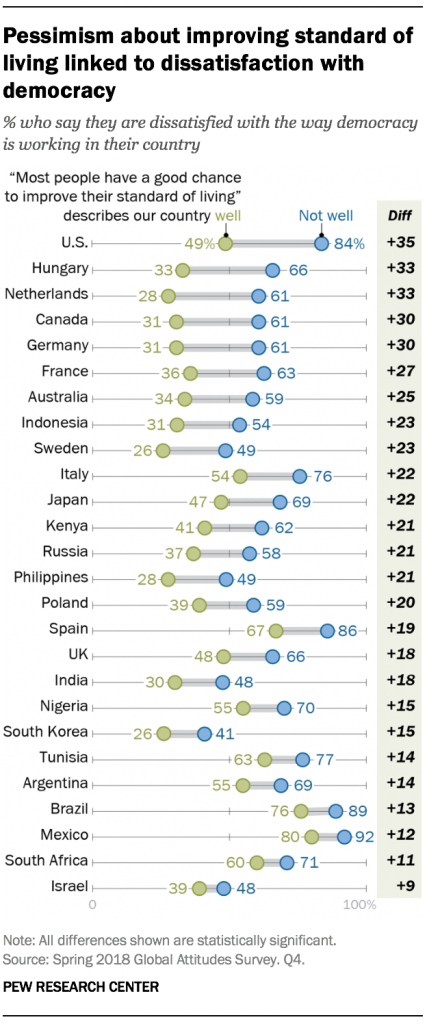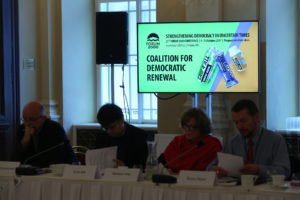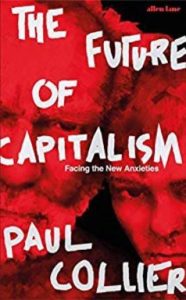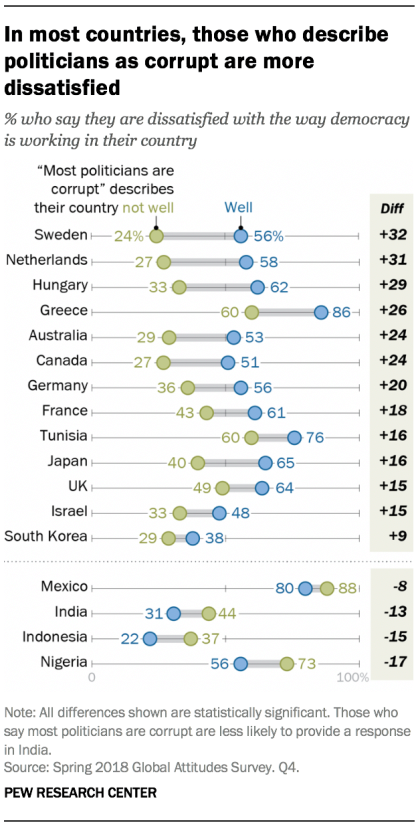 Widespread dissatisfaction with democracy has created political space of illiberal populist forces, which – like Hungary’s Viktor Orban – use democratic institutions for authoritarian ends. But popular discontent is also driving innovative efforts at democratic renewal.
Widespread dissatisfaction with democracy has created political space of illiberal populist forces, which – like Hungary’s Viktor Orban – use democratic institutions for authoritarian ends. But popular discontent is also driving innovative efforts at democratic renewal.
In nearly all countries surveyed, people who say the economy is doing poorly are more dissatisfied with the way democracy is working. And, in countries where views of the economy turned more negative over the past year, dissatisfaction also increased, according to the Pew Research Center (above). Views of whether most people can improve their standard of living are also related to democratic dissatisfaction [alongside dissatisfaction with politicians’ performance – below). Those who say their country is one in which most people cannot improve their standard of living tend to be more dissatisfied, Pew researchers note.

21st Forum 2000 Conference
But Denmark has shown how to renew democracy – at least its European social democratic variant – argues Paul Collier, professor of economics and public policy at Oxford University’s Blavatnik School of Government. Victorious party leader Mette Frederiksen is rebuilding a culture of shared identity, common purpose, and mutual obligations, reviving and refreshing the social contract underpinning democracy, he writes for The New Statesman:
Reciprocity needs a domain of shared identity: I need to know to whom I owe obligations, and who I can call upon. Moreover, this domain needs to be common knowledge: we must all know that everyone understands the same things. Over time, habits form and reciprocity evolves from being transactional, in which people keep the score, to being a more generalised presumption of mutual regard, analogous, albeit in a more limited range of behaviour, to a good marriage.
 A renewed agenda of reforms aimed at strengthening democratic resilience, understood as the capacity of social systems to take on crises and complex challenges as well as to survive them, innovate, and recover, is needed, argues International IDEA analyst Daniel Zovatto. The priority includes ensuring effective citizenship, expanding citizen participation, recovering the legitimacy of and credibility in the institutions, and ensuring full observance of the rule of law to lay the bases of a new generation democracy, with better quality and greater resilience, he contends.
A renewed agenda of reforms aimed at strengthening democratic resilience, understood as the capacity of social systems to take on crises and complex challenges as well as to survive them, innovate, and recover, is needed, argues International IDEA analyst Daniel Zovatto. The priority includes ensuring effective citizenship, expanding citizen participation, recovering the legitimacy of and credibility in the institutions, and ensuring full observance of the rule of law to lay the bases of a new generation democracy, with better quality and greater resilience, he contends.
To that end a set of political reforms needs to be set in motion whose objective is to have:
(i) modern and democratic parties with transparent financing, and legitimate legislatures with the capacity to represent and channel social demands, supplemented by mechanisms of citizen participation;
(ii) institutions and oversight mechanisms or checks that impede the abusive exercise of power and ensure appropriate levels of transparency and accountability; and
(iii) an independent judicial branch with adequate resources to ensure the full observance of the rule of law and juridical security.
 Denmark is also renewing the intermediate or mediating structures of civil society that reinforce democratic citizenship, adds Collier, the author of “The Future of Capitalism: Facing the New Anxieties” (Penguin):
Denmark is also renewing the intermediate or mediating structures of civil society that reinforce democratic citizenship, adds Collier, the author of “The Future of Capitalism: Facing the New Anxieties” (Penguin):
Common beliefs spread through crucibles of social inclusion and interaction: pre-school, sports, music, work, clubs, all have this potential. Discussion of immigration policy can no longer be divorced from such practical processes of integration. Long ignored — dismissed by an exclusionary right, and rejected by a left obsessed by individual entitlements — it is now part of the suite of 21st-century Social Democrat policies. Frederiksen is pioneering the renewal of European social democracy: at its core is the rebuilding of shared identity, common purpose, and mutual obligations that eludes the metropolitans.
 Prospects for democratic renewal were the subject of a conference – Reawakening the Spirit of Democracy – at Johns Hopkins University’s George Peabody Library.
Prospects for democratic renewal were the subject of a conference – Reawakening the Spirit of Democracy – at Johns Hopkins University’s George Peabody Library.
“Fundamentally what we have—and this is what I think is so damaging to democracy—is an increasing problem of trust,” said Washington Post columnist Anne Applebaum, a National Endowment for Democracy board member. “One of the effects of polarization is it makes people distrust mainstream institutions. They think the courts, or the press … have been captured by the other side, so it erodes trust for the institutions that hold the center together.”







